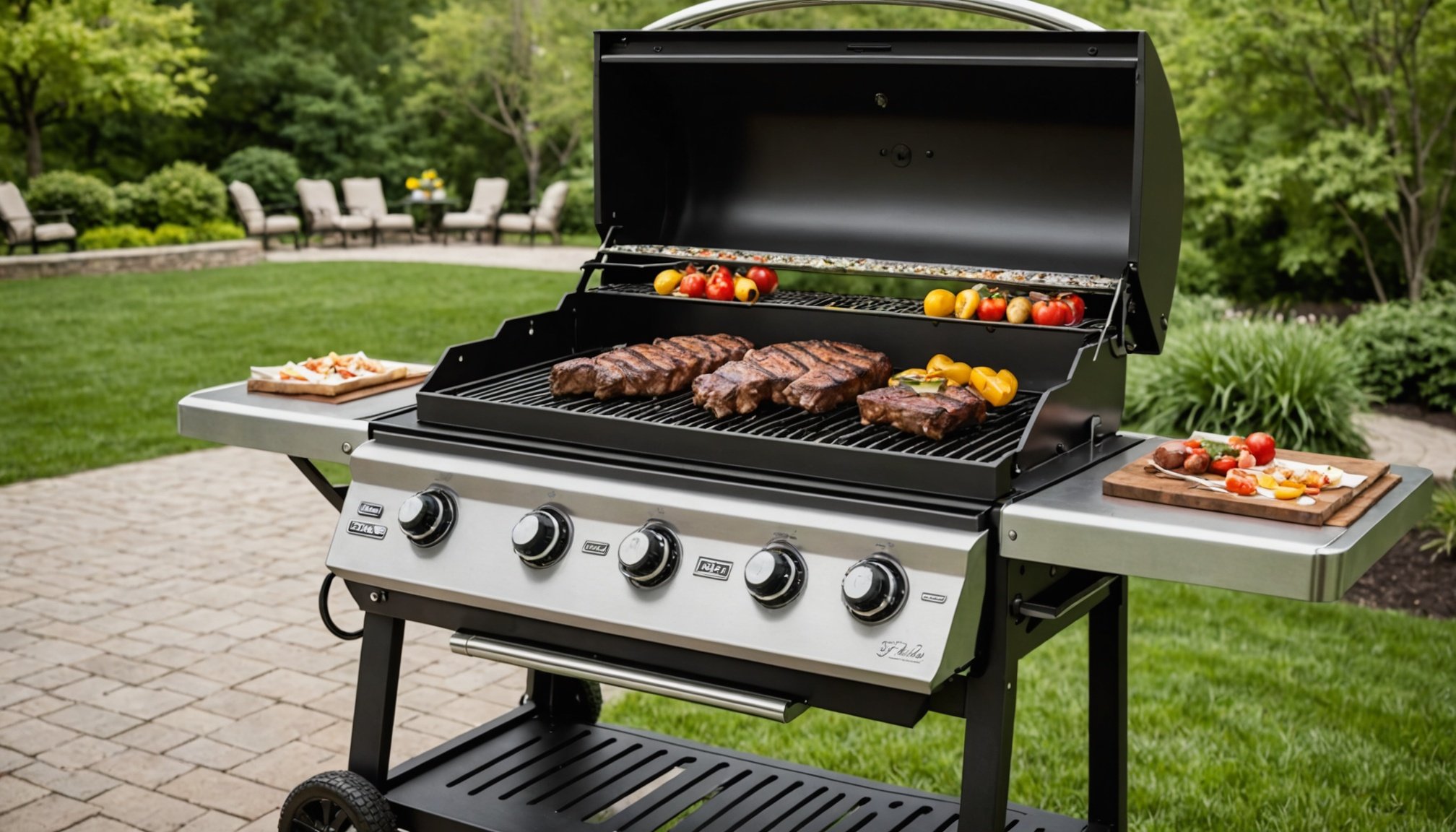Understanding Different Types of BBQ Grills
When considering types of BBQ grills, it’s crucial to appreciate their unique features and suitability for various cooking styles. Gas grills are popular for their quick heating, convenience, and ease of temperature control. Ideal for weekday dinners or gatherings that require consistent heat, they allow for precise cooking over a wide surface. However, they might lack the smokey flavor that barbecue enthusiasts crave.
Conversely, charcoal grills are celebrated for imparting a rich, smoky flavor, enhancing the taste profile of BBQ classics. Although they require more time and effort to ignite, many find the end result undeniably rewarding. These grills are suitable for those who enjoy the process of BBQing as much as the taste itself.
Also to discover : Essential Tips for Selecting the Ideal Loose Leaf Tea Infuser: A Comprehensive Guide
Electric grills offer a no-fuss alternative, often used in settings where open flame grilling isn’t feasible, such as apartments or small balconies. While they may lack the traditional barbecue flavor, their convenience and ease of use make them a viable option for simple grilling tasks.
Choosing the right grill depends significantly on personal preferences, frequency of use, and the desired balance between convenience and flavor. Understanding these aspects helps in making an informed decision.
Also to read : Essential Kitchen Scrapers: Master Dough Handling and Speed Up Your Cleanups with Ease!
Key Features to Consider in a BBQ Grill
When selecting a BBQ grill, essential grill features like heat output, material quality, size, and durability are critical in ensuring optimal performance and satisfaction.
Heat output is frequently measured in BTUs (British Thermal Units), and it directly influences how efficient and effective your grilling experience can be. A higher BTU rating does not necessarily imply better grilling, but it can indicate a grill’s capability to maintain temperatures consistently across a larger surface area. Consider this when matching grills with your specific cooking needs.
The size of the grill should align with both your outdoor space and the quantity of food you typically prepare. A compact model might suffice for a small balcony, while a larger backyard setup might benefit from a more spacious grill, supporting more food items and accommodating hungry guests.
Material quality significantly affects both the durability and performance of a grill. Stainless steel is popular due to its resistance to corrosion and attractive finish, while cast iron offers superior heat retention. Ensure the chosen material complements your desired longevity and outdoor conditions.
Overall, understanding these key features ensures a fitting choice tailored to your needs, promising great BBQ outings.
Comparing Performance and Value
Understanding the balance between grill performance and cost comparison is crucial when selecting the ideal BBQ grill. Performance metrics such as heat distribution, fuel efficiency, and cooking speed can significantly influence your grilling experience. For instance, a high-performing grill should consistently deliver even heat across its cooking surface, ensuring food is cooked uniformly.
When assessing cost vs. value in BBQ grills, it’s important to consider longevity, build material, and additional features. A pricier grill may offer superior materials and better craftsmanship, justifying its cost through extended durability and enhanced functionality. Meanwhile, a more budget-friendly option might require regular maintenance but still fulfill basic grilling needs.
Customer reviews play an invaluable role in evaluating potential purchases, revealing user experiences and satisfaction levels. Analyzing these reviews offers insight into both the strengths and weaknesses of a grill model, guiding you towards best value grills that align with your expectations.
Ultimately, a well-researched purchase should integrate performance with cost-effectiveness, ensuring you invest in a grill that stands the test of time while meeting your specific cooking requirements. Making informed decisions based on performance and value maximizes your enjoyment and satisfaction with your BBQ grill.
Expert Recommendations for Top BBQ Grills
When it comes to selecting the best in BBQ grills, relying on expert reviews and trusted brands can significantly facilitate your decision-making process. Specialists emphasize opting for top-rated BBQ grills, known for their exceptional performance and durability.
Several models stand out in various categories, giving you a range of excellent choices to consider. For those prioritizing convenience and precision, a gas grill is often recommended due to its easy temperature control and swift heating capabilities. If authenticity in flavour is your goal, a charcoal grill that delivers smoky perfection should be high on your list.
Key features contributing to expert endorsements include robust construction, consistent heat output, and added functionalities like side burners or rotisserie kits. Experienced BBQ enthusiasts suggest trusted brands such as Weber, known for engineering quality and lasting reliability.
For a balanced choice, explore models that have garnered positive user feedback. An insightful buyer’s guide typically outlines grills offering the best blend of performance and value, ensuring your investment aligns with both cooking needs and budget constraints. By cross-referencing expert opinions with your specific requirements, you’re more likely to find the perfect BBQ grill fit for your backyard feasts.
Maintenance and Safety Tips for BBQ Grills
Proper grill maintenance is crucial for ensuring longevity and peak performance across various grill types. Regular cleaning is vital; for gas grills, focus on unclogging burners and checking for gas leaks. Consistently remove ash and clean grates in charcoal grills to prevent buildup that impairs function. For electric grills, follow manufacturer instructions for safe cleaning to prevent electric hazards.
To prolong grill life, always cover your grill after each use to shield it from weather elements, which can cause rust and wear. Store it in a sheltered area or use a waterproof cover for protection during off-use seasons.
Safety tips are essential for carefree grilling. Always position the grill on a flat, stable surface and maintain a safe distance from flammable structures. Check connections in gas grills regularly, and keep a fire extinguisher nearby for emergencies. When storing fuel, ensure it’s in an appropriate container and location.
When cleaning, ensure all components have cooled down. Use appropriate tools like grill brushes for scraping grates and cloths for wiping surfaces. Clean drip trays as well, as accumulated grease can ignite. Following these cleaning procedures helps maintain safety and enhances the grill’s functionality.
Backyard Setup for BBQ Grilling
Creating the ideal backyard setup for BBQ grilling can significantly enhance your outdoor cooking experience. A well-designed outdoor cooking space integrates functionality with aesthetics, ensuring that your grilling activities are both efficient and enjoyable.
Grill Placement and Accessibility
Proper grill placement is crucial. Position your grill on a stable, flat surface to ensure safety and optimal performance. Consider locations that provide ample ventilation and maintain a safe distance from flammable structures. This strategic placement facilitates smooth movement around your outdoor kitchen, ensuring easy access to all grilling tools and ingredients.
Recommended Accessories and Tools
Equipping your grilling space with the right accessories can elevate your BBQ skills. Essential tools include tongs, a spatula, and grill brushes for comprehensive cleaning. Investing in a meat thermometer ensures precision cooking, achieving the perfect doneness for steaks and other grilled dishes. Additional accessories like side tables for prep work or a cooler for drinks can further enhance comfort and convenience.
Design your backyard grilling setup with these guidelines, and you will find that your outdoor gatherings become even more enjoyable and successful. Meeting these practical considerations creates an inviting atmosphere, where fantastic food and good company flourish.








